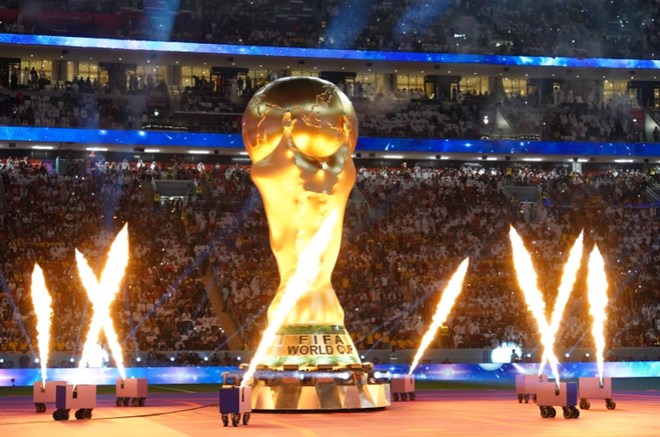
Monday November 21, 2022

Qatar's spectacular opening ceremony would have been missed by many BBC viewers [Sorin Furcoi/Al Jazeera]
The United Kingdom’s public service broadcaster has been criticised for choosing not to air the Qatar World Cup 2022 opening ceremony on its main coverage programme.
The BBC relegated coverage of the opening ceremony on Sunday to its second-tier streams, including its “red button” service, its online iPlayer app and its sports website.
Viewers tuning in to its flagship coverage on BBC One, however, were not able to watch the inclusivity-themed spectacular from the Al-Bayt Stadium in Al Khor, and missed highlights such as a performance by BTS star Jungkook and Qatari singer Fahad al-Kubaisi.Morgan Freeman, who narrated the ceremony, appeared in the stadium to shake hands with a FIFA World Cup ambassador suffering from a rare spinal disorder in an image meant to represent inclusion in a country that has been facing criticism over its human rights record.
BBC One had been airing the Chelsea-Tottenham match in the Women’s Super League, which finished after the opening ceremony had begun. The BBC’s social media team also put out a four-minute Instagram video at about the same time, recalling the 1982 Gay Games, organised by former Olympians to highlight homophobia in sport.
When the channel switched to its programme broadcast from Qatar, hosts Gary Lineker, Alex Scott and Alex Shearer discussed the allegations levelled against the host country.
“It’s the most controversial World Cup in history and a ball hasn’t even been kicked,” said Lineker, a former England football captain, in his opening monologue.
“Ever since FIFA chose Qatar back in 2010, the smallest nation to have hosted football’s greatest competition has faced some big questions. From accusations of corruption in the bidding process to the treatment of migrant workers who built the stadiums where many lost their lives.”
“Homosexuality is illegal here, women’s rights and freedom of expression are in the spotlight. Also the decision six years ago to switch the World Cup from summer to winter.
“Against that backdrop there’s a tournament to be played, one that will be watched and enjoyed around the world. Stick to football say FIFA, well, we will, for a couple of minutes at least.”
In the 12 years since it was awarded the right to host the first World Cup in the Middle East, Qatar has reformed its labour laws, including abolishing the much-criticised kafala system and the exit permit system, which had been abused by unscrupulous employers. Qatar has also introduced a minimum wage and new regulations on working in heat as part of labour reforms.
In a report released this month, the International Labour Organization (ILO) said Qatar had made progress in its labour reforms — improving the working and living conditions for hundreds of thousands of workers — but said challenges in implementation remained.
World Cup organisers say that all fans, no matter their sexual orientation, are welcome in Qatar.
In Qatar’s conservative society, public displays of affection are frowned upon, not just those between LGBTQ couples.
A BBC spokesperson told Al Jazeera that: “Full build-up and coverage of the World Cup has been available across the BBC, including the opening ceremony on iPlayer.”
BBC host Gary Lineker fired back at critics, saying it was all a matter of timing and logistics, tweeting: “It was shown live in its entirety on @BBCiPlayer, BBC Sport website and red button. The timing of the opening ceremony was changed to an earlier time very recently and WSL was already confirmed on @bbcone. If you wanted to watch it, you could.”
The World Cup’s opening match and ceremony were brought forward by a day from FIFA’s original plan, with the move announced more than three months ago, in August.